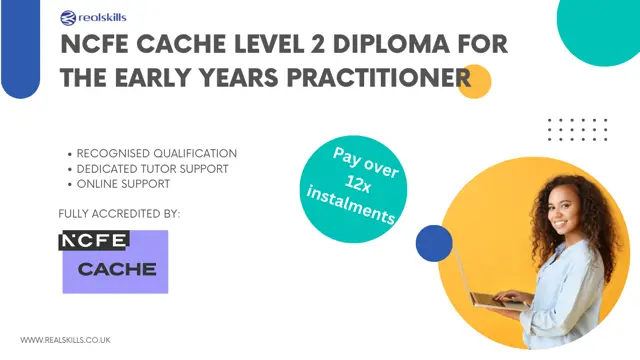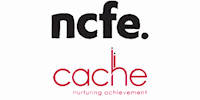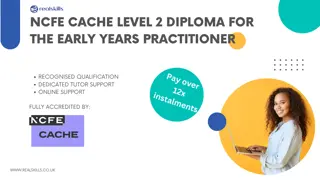
NCFE CACHE Level 2 Diploma for the Early Years Practitioner
NCFE accredited online course with tutor support
Real Skills Training
Summary
Subject to approval, we can offer payment plans over 12 monthly instalments with a deposit.
- NCFE Accredited Certificate - Free
- Tutor is available to students
Add to basket or enquire
Overview
The aim of this qualification is to provide you with the knowledge and understanding of babies and young children from birth to 7 years of age with applied knowledge in the early years, 0-5 years.
The qualification content meets the Department for Education’s (DfE) Level 2 full and relevant criteria for a Level 2 Early Years Practitioner in the workforce.
Qualification
Certificates
NCFE Accredited Certificate
Hard copy certificate - Included
Certificate will be sent following successful completion of the qualification, internal quality assurance and external quality assurance by the awarding body.
Resources
- Course Flyer -
Description
This course is offered through a combination of remote face-to-face tutor-led sessions, in-person observations and online learning. You will have access to a dedicated tutor who will provide support and guidance throughout your studies.
You will also have access to a range of learning resources, including online study materials and assessment tools. The course is designed to be flexible, allowing you to fit your studies around your work and other commitments. To gain this qualification, learners must achieve a total of 37 credits from all 14 mandatory units.
You will need to be working, volunteering or on practical placement to show competence in both knowledge and skills. We recommend learners complete 250 placement hours whilst undertaking this qualification.
Placement opportunity must allow for skills application with babies and young children sufficient to meet the assessment criteria for the qualification.
As part of the qualification, you will cover the following 14 mandatory units:
- Roles and Responsibilities of the Early Years Practitioner (R/617/2630) -Explore the fundamental roles and responsibilities of early years practitioners, including ethical practices, professional development, and effective communication within early years settings.
- Health and Safety of Babies and Young Children in the Early Years (Y/617/2631) -This unit focuses on the critical aspects of health and safety for babies and young children, covering risk assessments, safety procedures, and emergency response strategies in early years environments.
- Equality, Diversity and Inclusive Practice in Early Years Settings (D/617/2632) -Learn to create inclusive environments that respect and celebrate diversity. This unit covers implementing inclusive practices and promoting equality in early years settings.
- Safeguarding, Protection and Welfare of Babies and Young Children in Early Years Settings (H/617/2633) -Delve into safeguarding principles and practices necessary to protect the welfare of babies and young children, including legal frameworks, policies, and procedures in early years settings.
- Understand How to Support Children's Development (K/617/2634) -Gain insights into the developmental milestones of children from birth to age 5, including cognitive, physical, and emotional development, and learn strategies to support these developmental stages.
- Support Care Routines for Babies and Young Children (M/617/2635) -This unit provides knowledge on establishing effective care routines for babies and young children, including feeding, sleeping, hygiene practices, and fostering independence.
- Support the Planning and Delivery of Activities, Purposeful Play Opportunities and Educational Programmes (T/617/2636) -Learn to design and implement educational and play-based activities that stimulate learning and development, with an emphasis on creativity, exploration, and learning outcomes.
- Promote Play in an Early Years Setting (A/617/2637) -Understand the critical role of play in early development and explore various methods to promote engaging and educational play in early years settings.
- Support Well-Being of Babies and Young Children for Healthy Lifestyles (F/617/2638) -Focus on promoting the physical and emotional well-being of young children, including nutrition, physical activity, and emotional health practices.
- Support Babies and Young Children to be Physically Active (J/617/2639) -Learn techniques and activities to encourage physical development and activity among babies and young children, emphasizing safety and fun.
- Support the Needs of Babies and Young Children With Special Educational Needs and Disability (L/617/1993) - Gain skills to support children with special educational needs and disabilities (SEND), including adapting environments, activities, and using inclusive teaching strategies.
- Promote Positive Behaviour in Early Years Settings (F/617/2641) -Explore strategies to promote positive behavior in young children, including behavior management techniques and fostering a supportive and nurturing environment.
- Partnership Working in the Early Years (J/617/2642) -Learn about the importance of collaboration and partnership between parents, caregivers, and other professionals in early years settings to enhance the developmental outcomes of children.
- Support the Needs of the Child in Preparing for School (L/617/2643) - Prepare children for the transition to school with strategies that support emotional, social, and academic readiness, and foster a smooth transition from early years settings to formal schooling.
Each unit provides a deep dive into specialised aspects of early childhood care and education, ensuring comprehensive preparation for those entering or advancing in this field.
Who is this course for?
This qualification is ideal for individuals looking to work with children between birth and 5 years, and gain knowledge of working with children up to 7 years. Learners do not need to have previous experience or qualifications in working with children to undertake this qualification.
Requirements
There are no mandatory requirements to complete this qualification. However, you will need to be working, volunteering or on practical placement to show competence in both knowledge and skills. We recommend learners complete 250 placement hours whilst undertaking this qualification.
Career path
This qualification allows a learner to count towards the Level 2 ratio as a qualified Level 2 Early Years Practitioner across the Early Years Workforce.
Learners may work under supervision in a variety of roles such as:
- nursery practitioner
- classroom assistant
- pre-school practitioner.
Questions and answers
Reviews
Currently there are no reviews for this course. Be the first to leave a review.
Legal information
This course is advertised on reed.co.uk by the Course Provider, whose terms and conditions apply. Purchases are made directly from the Course Provider, and as such, content and materials are supplied by the Course Provider directly. Reed is acting as agent and not reseller in relation to this course. Reed's only responsibility is to facilitate your payment for the course. It is your responsibility to review and agree to the Course Provider's terms and conditions and satisfy yourself as to the suitability of the course you intend to purchase. Reed will not have any responsibility for the content of the course and/or associated materials.



